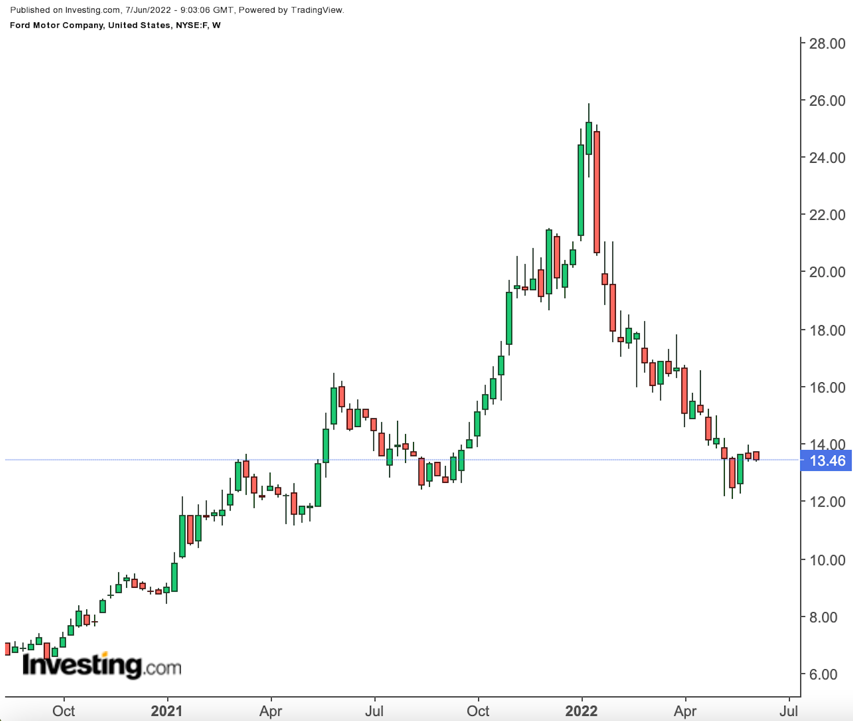This article was written exclusively for Investing.com
There seems to be a simple and attractive bull case for Ford (NYSE:F) stock. Shares of the US car giant are cheap, at less than 7x the consensus earnings estimate for this year. Yet, the company should have potential for growth as its planned lineup of electric vehicles (EVs) comes to market.
Of late, that bull case hasn't helped: Ford stock has been nearly halved from January highs.
It's possible that the sell-off is a buying opportunity, with F getting caught in a broad market downdraft. But it's more likely that the simple bull case isn't quite as attractive as investors believed it was at the beginning of the year.
There are real challenges here and legitimate reasons why F stock is priced at such a low multiple to backward-looking earnings. Ford's sales for May highlight those challenges and show why the bull case isn't quite as simple as it looks.
Ford Stock at 7x Earnings
From a headline perspective, Ford looks almost absurdly cheap. As noted, Ford is valued at 7x this year's earnings estimate; Tesla (NASDAQ:TSLA) trades at 59x on the same basis. The Ford dividend yield is a healthy 3% as well.
But in a historical context, neither the P/E multiple nor the dividend yield is all that distinctive. For most of the 2010s, Ford stock received a single-digit P/E multiple. For most of that decade, a low P/E multiple wasn't enough.
F shares ended 2019 below $10, down by almost half from 2014 levels. As the stock slipped, Ford's dividend yield kept rising; in December 2019, F yielded 6.3%, more than double the current level.
Simply put, Ford's own history shows that the stock isn't guaranteed to go up simply because the stock looks cheap. That aside, there's a case that the stock should look cheap, particularly right now.
After all, there are few more cyclical businesses than auto manufacturers. Demand can fade significantly when the economy turns downward. And investors generally discount cyclical stocks owing to their inconsistent earnings. At a moment when there are clear warning signs of a recession that could send Ford earnings plummeting, there's even more reason for caution.
There are longer-term worries as well. Automobiles have ever-extending useful lives. In 2000, there were 17.4 million light vehicles sold in the U.S. That peak wasn't recaptured until 2015—and only thanks to years of consumer caution following the 2008-09 financial crisis. In 2019, a strong economic year, unit sales still were more than 2% below 2000 levels.
For these reasons, other legacy car manufacturers receive similar treatment from investors. General Motors (NYSE:GM) trades at less than six times this year's consensus earnings estimate. Toyota (NYSE:TM) is at 10x, even with a greater penetration of faster-growing markets in Asia as well as hybrid and electric vehicles (that company estimates EVs will account for about 28% of unit sales this year).
In the context of history and the sector, Ford stock isn't really that cheap. And it bears repeating: it's been cheap before, yet that did little for shareholders.
Electric Vehicle Growth
To be sure, the analysis so far has left out a key catalyst: Ford's grand plans for its own EV business. At a presentation in early March, management announced a production target of over 2 million EVs by 2026. The company sold 2.4 million units in 2019, and just 1.9 million last year.
That kind of scale should lower costs—and boost profits. Ford expects operating margins that year to reach 10%, up from a little over 7% last year. Even if it can capture a small slice of the EV market, there seems plenty of room for upside. Tesla has a market capitalization of $740 billion, more than thirteen times that of Ford.
It was optimism toward the EV strategy that helped send Ford stock soaring in 2020 and 2021 (the shares rose more than 500% from March 2020 lows). And it's likely the reversal of that optimism has contributed to the sell off of late; EV-related stocks of all kinds (TSLA included) have declined year-to-date; many started selling off last year.
But the recent skepticism makes some sense. There are real questions about how, exactly, manufacturers can secure the minerals needed to produce the batteries that power electric vehicles. Lithium supplies, in particular, don't look like enough. Even manufacturers that can find lithium will pay dearly: prices have risen 400%, which in turn will make EVs more expensive. Even if the U.S. (and the world) dodge a near-term recession, the outlook for EVs looks notably dimmer than it did just a few months ago.
Internal Combustion Engine Problem for F Stock
However EV adoption occurs going forward, Ford has another key problem. EV sales and internal combustion engine (ICE) sales are zero-sum. EVs aren't additive to the overall market; they're simply replacing legacy models.
And Ford's current profits and revenue are coming almost solely from those legacy models. This is not a problem that Tesla or Lucid (NASDAQ:LCID) or Rivian Automotive (NASDAQ:RIVN) will have to deal with.
As a result, the seeming incongruity between the valuation applied to EV-only manufacturers and that applied to Ford makes some sense. As Ford's EV penetration grows, its ICE profits will decline. There's simply no two ways about it.
Indeed, we're already seeing as much. Ford sales in May seem to strengthen the EV-driven case for the stock: unit EV sales increased 222% year-over-year.
That's the good news. But Ford's total sales still fell 4.5%, thanks to a 7.3% decline in ICE sales.
It's possible that Ford's EV sales grow faster than its ICE sales fall. Indeed, the company did take U.S. market share last month. But it's not guaranteed that the company can generate overall growth. At the very least, that growth is going to be muted to at least some extent by customer shifts away from its ICE lineup—which includes its market-leading (and highly profitable) F-150 pickup.
This doesn't mean Ford stock is a short, or that the company is going to go bankrupt. There's certainly still some potential for growth over time, even if results in coming quarters show some weakness. And at 7x earnings, Ford stock has room to rally if its EV strategy works out.
But that's a big if. Success is not guaranteed. Ford has a lot of work left to do. The decline in Ford stock seems a result of investors finally understanding that key fact.
Disclaimer: As of this writing, Vince Martin has no positions in any securities mentioned.
***
Looking to get up to speed on your next idea? With InvestingPro+, you can find:
- Any company’s financials for the last 10 years
- Financial health scores for profitability, growth, and more
- A fair value calculated from dozens of financial models
- Quick comparison to the company’s peers
- Fundamental and performance charts
And a lot more. Get all the key data fast so you can make an informed decision, with InvestingPro+. Learn More »
